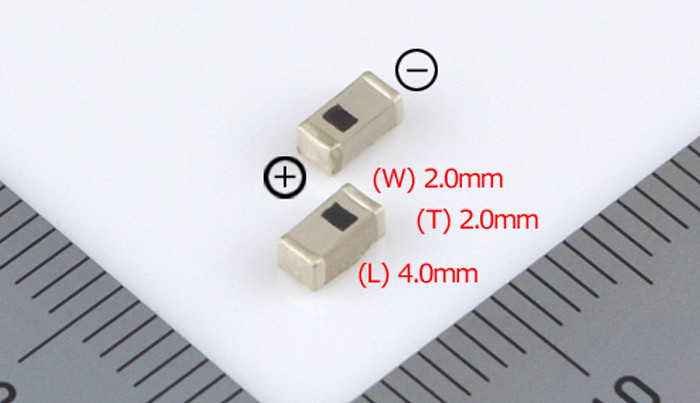Tiny SMD-outline battery
January 18, 2019
on
on

The Japanese component manufacturer FDK plans to begin shipping samples of its new, oxide-based SMD solid-state battery in February 2019. The cathode material of this tiny battery consists of lithium cobalt pyrophosphate (Li2CoP2O7), and was developed in association with Fujitsu Laboratories.
As more mobile IoT applications emerge and smaller gadgets of all kinds evolve and become ubiquitous, the search for a suitably small mobile power source becomes ever more pressing. Battery properties such as high energy density, stability and safety in the smallest outline are becoming increasingly important. This is exactly where solid-state battery variants will score in the race to power the next generation of devices. Lithium cobalt pyrophosphate (Li2CoP2O7) is used for the cathode material in this new SMD battery which has high energy density, superior safety and long life.
FDK has developed an ultraminiature solid-state version of the battery with a high nominal output voltage. It has an SMD outline which allows it to be PCB-mounted using the usual fully-automatic miniature device assembly methods, saving costs and board space.
Technical specifications:
• SMD version 4 x 2 x 2 mm (LxWxD)
• Output voltage 3.0 V
• Energy rating 140 μAh
• Energy density 26 mWh / cm³
• Operating temperature range -20 to +105 °C
• High safety and environmental compatibility
• Constructed using non-combustible materials
• Constructed with stable oxide sintered ceramics (sulfide free)
The battery is ideal for use with low-power mobile devices which require a power source with a small footprint, high capacity and the ability to operate over a wide temperature range. Such applications include IoT End Devices, wearables, emergency backup for RTCs (Real Time Clock), SRAMs and low-power MCUs. The battery is robust and able to operate in harsh environments including a vacuum. The company is planning to have samples of a higher-capacity version of the SMD battery available in April 2019.
As more mobile IoT applications emerge and smaller gadgets of all kinds evolve and become ubiquitous, the search for a suitably small mobile power source becomes ever more pressing. Battery properties such as high energy density, stability and safety in the smallest outline are becoming increasingly important. This is exactly where solid-state battery variants will score in the race to power the next generation of devices. Lithium cobalt pyrophosphate (Li2CoP2O7) is used for the cathode material in this new SMD battery which has high energy density, superior safety and long life.
FDK has developed an ultraminiature solid-state version of the battery with a high nominal output voltage. It has an SMD outline which allows it to be PCB-mounted using the usual fully-automatic miniature device assembly methods, saving costs and board space.
Technical specifications:
• SMD version 4 x 2 x 2 mm (LxWxD)
• Output voltage 3.0 V
• Energy rating 140 μAh
• Energy density 26 mWh / cm³
• Operating temperature range -20 to +105 °C
• High safety and environmental compatibility
• Constructed using non-combustible materials
• Constructed with stable oxide sintered ceramics (sulfide free)
The battery is ideal for use with low-power mobile devices which require a power source with a small footprint, high capacity and the ability to operate over a wide temperature range. Such applications include IoT End Devices, wearables, emergency backup for RTCs (Real Time Clock), SRAMs and low-power MCUs. The battery is robust and able to operate in harsh environments including a vacuum. The company is planning to have samples of a higher-capacity version of the SMD battery available in April 2019.
Read full article
Hide full article


Discussion (2 comments)